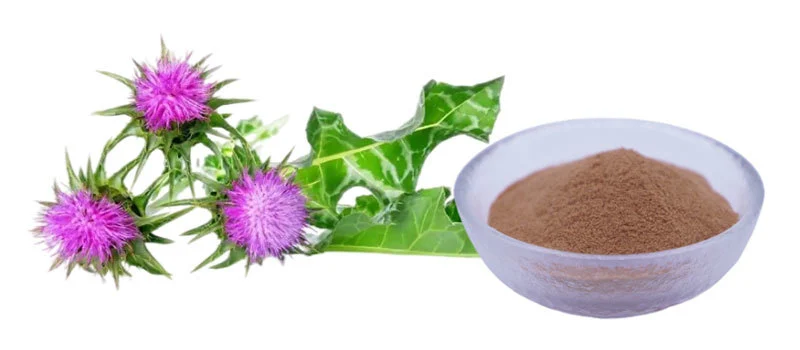Comparison of Silymarin Powder and Other Herbal Extracts
In the ever-evolving landscape of natural health supplements, silymarin powder has emerged as a potent contender, particularly in the realm of liver support and overall wellness. Derived from the seeds of the milk thistle plant (Silybum marianum), silymarin powder offers a concentrated form of flavonolignans that have garnered significant attention in both scientific research and consumer markets. This blog post aims to provide a comprehensive comparison between silymarin powder and other popular herbal extracts, focusing on their efficacy, bioavailability, and clinical evidence. By examining the unique properties of silymarin powder alongside alternatives such as milk thistle, turmeric, and dandelion root, we seek to illuminate why formulators and health-conscious consumers are increasingly turning to this golden-yellow powder for its robust antioxidant and hepatoprotective benefits.

Evaluating Liver Support Efficacy: Silymarin Powder vs. Milk Thistle, Turmeric, and Dandelion Root
Silymarin Powder: The Concentrated Powerhouse
Silymarin powder stands out as a highly concentrated form of milk thistle extract, offering a standardized 80% silymarin content. This potent formulation ensures that consumers receive a consistent and powerful dose of the active compounds responsible for liver support. The high concentration of silymarin in powder form allows for greater flexibility in dosing and formulation, making it an attractive option for manufacturers of supplements and pharmaceuticals. Studies have shown that silymarin powder exhibits strong hepatoprotective properties, effectively shielding liver cells from oxidative stress and promoting cellular regeneration. Its ability to stimulate protein synthesis in liver cells further enhances its restorative capabilities, making it a frontrunner in liver health supplementation.
Milk Thistle: The Traditional Approach
While milk thistle is the source of silymarin, using the whole herb or less concentrated extracts may not provide the same level of efficacy as silymarin powder. Traditional milk thistle supplements often contain varying amounts of silymarin, depending on the extraction process and standardization methods used. This inconsistency can lead to unpredictable results in liver support. However, whole milk thistle does offer a holistic approach, providing additional compounds that may work synergistically with silymarin. When comparing silymarin powder to traditional milk thistle supplements, the former typically demonstrates superior bioavailability and more consistent results in clinical studies, particularly in cases of liver disease and toxicity.
Turmeric and Dandelion Root: Complementary Alternatives
Turmeric and dandelion root are often cited as alternatives for liver support, each offering unique benefits. Turmeric, with its active compound curcumin, provides potent anti-inflammatory and antioxidant effects that can benefit liver health. However, curcumin's poor bioavailability limits its effectiveness unless paired with absorption enhancers. Dandelion root, traditionally used for liver and digestive support, contains compounds that may stimulate bile production and aid in detoxification. While both herbs show promise, their specific actions on liver health differ from silymarin powder. Silymarin's direct hepatoprotective effects, coupled with its ability to regenerate liver cells, often make it a preferred choice for targeted liver support. When formulating liver health supplements, many manufacturers opt for silymarin powder as the primary ingredient, sometimes incorporating turmeric or dandelion root as complementary components to create a comprehensive liver support formula.
A Comparative Analysis of Antioxidant and Anti-Inflammatory Properties in Herbal Formulations
Silymarin Powder's Antioxidant Prowess
Silymarin powder distinguishes itself through its exceptional antioxidant capabilities, which are crucial in combating oxidative stress—a key factor in liver damage and various chronic diseases. The flavonolignans in silymarin powder, particularly silybin, have demonstrated superior free radical scavenging abilities compared to many other herbal extracts. This potent antioxidant action not only protects liver cells from damage but also extends its benefits to other organs and systems throughout the body. In comparative studies, silymarin powder has shown to be more effective in neutralizing harmful free radicals than vitamin E, a well-known antioxidant. This remarkable antioxidant profile makes silymarin powder an attractive ingredient for formulators developing products aimed at overall cellular protection and anti-aging benefits.
Anti-Inflammatory Effects: A Crucial Comparison
While many herbal extracts boast anti-inflammatory properties, silymarin powder offers a unique mechanism of action that sets it apart. Its anti-inflammatory effects are closely tied to its ability to inhibit the NF-κB pathway, a key regulator of inflammatory responses in the body. This specific action makes silymarin powder particularly effective in addressing liver inflammation, which is often at the root of various hepatic disorders. When compared to turmeric, another potent anti-inflammatory herb, silymarin powder shows comparable efficacy but with the added benefit of targeted liver protection. Dandelion root, while possessing some anti-inflammatory properties, generally doesn't match the potency of silymarin powder in this regard. The dual action of silymarin powder—combining strong antioxidant and anti-inflammatory properties—creates a synergistic effect that enhances its overall efficacy in liver health and beyond.
Formulation Considerations for Maximum Benefit
When formulating herbal supplements for antioxidant and anti-inflammatory benefits, the choice of ingredients and their interactions play a crucial role in the final product's efficacy. Silymarin powder's stability and compatibility with other ingredients make it an excellent base for such formulations. Its powdered form allows for easy incorporation into various delivery systems, from capsules to liquid extracts. Some formulators choose to combine silymarin powder with other antioxidant-rich extracts like green tea or resveratrol to create comprehensive antioxidant blends. However, it's important to note that silymarin powder's unique liver-protective properties often make it the star ingredient in liver health formulations. The standardized nature of silymarin powder also ensures consistent potency across batches, a critical factor for manufacturers aiming to produce reliable and effective supplements.
Why Formulators Choose Silymarin Powder: Bioavailability and Clinical Evidence Versus Alternatives
Superior Bioavailability of Silymarin Powder
One of the primary reasons formulators gravitate towards silymarin powder is its enhanced bioavailability compared to other forms of milk thistle extract and alternative herbal ingredients. The fine, easily dispersible nature of silymarin powder allows for better absorption in the gastrointestinal tract, leading to increased bioavailability of its active compounds. This is particularly important given that silymarin, in its natural form, has relatively low water solubility. Advanced formulation techniques, such as liposomal encapsulation or nanoparticle technology, can further enhance the bioavailability of silymarin powder. These methods not only improve absorption but also protect the active compounds from degradation in the digestive system. When compared to whole milk thistle or less refined extracts, silymarin powder consistently demonstrates superior bioavailability, translating to more effective dosing and potentially better clinical outcomes.
Robust Clinical Evidence Supporting Silymarin Powder
The wealth of clinical evidence supporting the use of silymarin powder is a significant factor in its popularity among formulators. Numerous studies have demonstrated its efficacy in liver health, particularly in cases of alcoholic liver disease, non-alcoholic fatty liver disease (NAFLD), and hepatitis. A meta-analysis of clinical trials showed that silymarin supplementation led to significant improvements in liver enzyme levels and overall liver function. This strong clinical backing provides formulators with confidence in the product's efficacy and safety profile. In contrast, while herbs like dandelion root and turmeric have traditional uses for liver support, the clinical evidence for their efficacy in liver diseases is less extensive. The robust scientific support for silymarin powder not only aids in product development but also provides valuable information for marketing and regulatory compliance, making it an attractive choice for companies looking to develop evidence-based liver health supplements.
Versatility in Product Development
Silymarin powder's versatility in product development is another key factor in its popularity among formulators. Its stable powder form allows for easy incorporation into a wide range of delivery systems, including capsules, tablets, powders, and even liquid formulations when properly solubilized. This flexibility enables manufacturers to create diverse product lines catering to different consumer preferences and needs. Additionally, silymarin powder's compatibility with other ingredients opens up possibilities for innovative formulations. For instance, it can be combined with phospholipids to create more bioavailable complexes or blended with other liver-supportive herbs for synergistic effects. The ability to standardize silymarin content in the powder form also ensures consistent potency across different batches and products, a critical factor in quality control and regulatory compliance. This level of versatility and control is often harder to achieve with whole herb extracts or less refined alternatives, making silymarin powder a preferred choice for formulators looking to develop high-quality, efficacious liver support products.
Conclusion
In conclusion, silymarin powder emerges as a superior choice among herbal extracts for liver support and overall wellness. Its concentrated form, exceptional bioavailability, and robust clinical evidence set it apart from alternatives like whole milk thistle, turmeric, and dandelion root. Formulators and health-conscious consumers alike benefit from silymarin powder's potent antioxidant and anti-inflammatory properties, as well as its versatility in product development. As research continues to unveil the full potential of silymarin, its role in nutraceutical and pharmaceutical applications is likely to expand, solidifying its position as a key player in the realm of natural health supplements.
For those seeking high-quality silymarin powder and expert formulation support, Avans NutriHealth Co., Ltd. stands as a leading manufacturer and supplier in China. With a commitment to innovation, quality, and customer satisfaction, Avans offers premium silymarin powder and a range of plant extracts, nutritional supplements, and cosmetic ingredients. Our state-of-the-art facilities, certified by ISO, HACCP, and BRC standards, ensure products of the highest quality. For inquiries or to discuss your formulation needs, please contact us at Lillian@avansnutri.com. Let Avans be your partner in developing next-generation health and wellness products.
FAQ
Q: What is the recommended dosage of silymarin powder for liver support?
A: The typical dosage ranges from 200-400 mg of silymarin powder taken 2-3 times daily, but it's best to consult with a healthcare professional for personalized advice.
Q: Can silymarin powder be combined with other herbs for enhanced liver support?
A: Yes, silymarin powder can be safely combined with other liver-supportive herbs like milk thistle, dandelion root, or artichoke leaf for potentially synergistic effects.
Q: How does the bioavailability of silymarin powder compare to whole milk thistle supplements?
A: Silymarin powder typically offers superior bioavailability compared to whole milk thistle supplements due to its concentrated and standardized form.
Q: Are there any known side effects of taking silymarin powder?
A: Silymarin powder is generally well-tolerated, but some people may experience mild gastrointestinal discomfort. It's always best to consult with a healthcare provider before starting any new supplement regimen.
Q: How long does it take to see the benefits of silymarin powder supplementation?
A: While individual responses vary, some people report improvements in liver function markers within 4-8 weeks of consistent silymarin powder supplementation.
References
1. Abenavoli, L., Capasso, R., Milic, N., & Capasso, F. (2010). Milk thistle in liver diseases: past, present, future. Phytotherapy Research, 24(10), 1423-1432.
2. Saller, R., Meier, R., & Brignoli, R. (2001). The use of silymarin in the treatment of liver diseases. Drugs, 61(14), 2035-2063.
3. Loguercio, C., & Festi, D. (2011). Silybin and the liver: from basic research to clinical practice. World Journal of Gastroenterology, 17(18), 2288-2301.
4. Vargas-Mendoza, N., Madrigal-Santillán, E., Morales-González, A., et al. (2014). Hepatoprotective effect of silymarin. World Journal of Hepatology, 6(3), 144-149.
5. Bijak, M. (2017). Silybin, a Major Bioactive Component of Milk Thistle (Silybum marianum L. Gaernt.)—Chemistry, Bioavailability, and Metabolism. Molecules, 22(11), 1942.
6. Federico, A., Dallio, M., & Loguercio, C. (2017). Silymarin/Silybin and Chronic Liver Disease: A Marriage of Many Years. Molecules, 22(2), 191.



